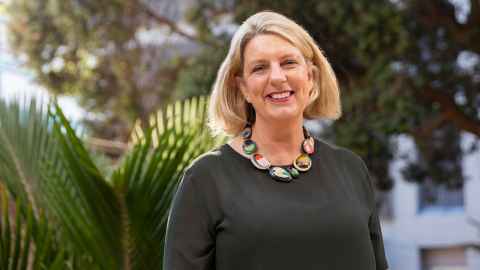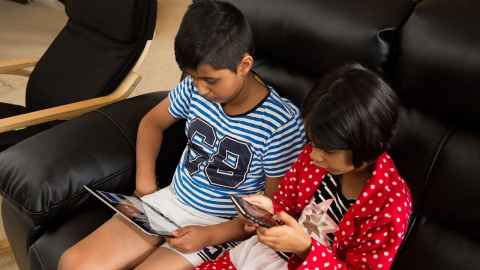Growing Up in New Zealand study: now they are eight
5 May 2020
Professor Susan Morton and her team of researchers will soon release their latest data from the Growing Up in New Zealand study.

Professor Susan Morton is the type who sees the silver lining in challenging situations. Take the Covid-19 lockdown and subsequent disruptions to life as we know it.
The epidemiologist and specialist in public health medicine in the Faculty of Medical and Health Sciences, has been leading the largest longitudinal study in the country, Growing Up in New Zealand. Every two years the researchers undertake more than 6,000 interviews over a year to collect information from the children and their families. Rather than panic that her team’s efforts of the past 15 years would be disrupted, she says lockdown prompted researchers to focus on speeding up the process of modernising the technology and techniques used in interviews.
“We have been planning the development of online/digital data collection as a primary method rather than a complementary one for the future so this has accelerated the process. We need to consider how we will engage with the children aged 11, currently being planned for 2021.”
Growing Up in New Zealand has been following its group of families since 2009/10, before the birth of the children. One of the challenges researchers were already looking at was finding ways to engage appropriately with the children as they grew older.
“All over the world in similar studies, as children move into adolescence, challenges increase in terms of connecting with them rather than their parents,” says Susan.
“Our children are coming up to 11 years old and they’re digital natives. So we’ve been constantly thinking about methodological innovations; how to do things differently and engage in a way that will ensure the children feel valuable by contributing their voice to inform policy.”
The way we collect information needs to change over time as the children become more independent and have their own voices.

It’s a study their parents bought into more than 12 years ago and the families agreed for their children to be followed through until adulthood.
“We brought families on board with the parents’ knowledge that we wanted to engage with these children until they were 21,” says Susan.
“The way we collect information needs to change over time as the children become more independent and have their own voices.
“So even before Covid-19’s challenges, we had set up a parallel project funded by the MBIE Endeavour Grant. That project, worth $6 million over five years, is to set up a process to co-design innovative digital methods and platforms to engage with the children as they move into adolescence.
"We need to recognise that researchers and academics are not very well connected into the world of 11-year-olds or 14-year-olds or 17-year-olds. We’re going to be working with technology partners and with the cohort members themselves to come up with ways they would like to engage.”
Covid-19, therefore, has been a reminder of the need to front-foot the technology needed.
Growing Up in New Zealand was launched in April 2008, after several years in the planning. The Government’s Well-being Budget in 2019 recognised its contribution by providing a further $17 million of funding to continue following the children into their adolescent years.
The aim of the study has been to gather information about the children in the context of their families, to chart their challenges and successes, in health, education, social and peer relationships – everything that’s part of life.
In the next few months, Susan and the team of researchers will release their latest report through the Ministry of Social Development, based on the data collected at the eight-year interviews.
“What we are gathering at the coal face are stories and evidence that can inform policy. This year, our approach to the report has been to tie it to the Government’s Well-being Strategy, which aligns exactly with the framework that we put in place for the study when it began 15 years ago.”
Families’ circumstances will almost certainly change in the coming months so the next data collection will be important to track changes and their impact on well-being.
“We always try to understand what shapes resilience in the face of hardship,” says Susan.
“We look at what helps families to move out of situations of hardship. The information the children and families share with us allows us to provide evidence to help inform strategies to assist them and all families in New Zealand.”
– Denise Montgomery
UPDATE 7 May: The study also plans to carry out a digital survey with cohort children in May to gather information about their experiences of “lockdown” at Covid-19 Alert Levels 4 and 3. Professor Susan Morton says hearing the voices of children is crucial to provide insights into how young people may have been impacted by the pandemic.
Find out more about the Growing Up in New Zealand study at www.growingup.co.nz
This article first appeared in the May 2020 edition of UniNews magazine.